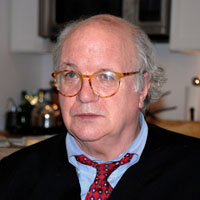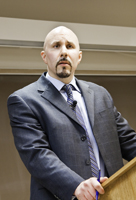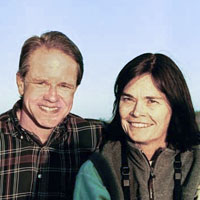
Carolyn Merchant is Chancellor’s Professor of Environmental History, Philosophy, and Ethics in the Department of Environmental Science, Policy, and Management, University of California, Berkeley. She is a prominent scholar whose work focuses on American environmental and cultural history in the overall context of Western history, philosophy, and the history of science. Among her most influential books are her groundbreaking monograph, The Death of Nature: Women, Ecology, and the Scientific Revolution (1980); The Columbia Guide to American Environmental History (2002; 2nd ed. 2007); and Reinventing Eden: The Fate of Nature in Western Culture (2003). The author of numerous articles on the history of science, environmental history, and women and the environment, Merchant has been awarded multiple NEH and NSF grants as well as Guggenheim and McArthur fellowships.
The Media and American Politics
Thomas B. Edsall
April 8, 2009, Dogwood Room, Indiana Memorial Union

Thomas B. Edsall is the political editor of the Huffington Post and Joseph Pulitzer II and Edith Pulitzer Moore Professor at the Columbia Graduate School of Journalism. From 1981 to 2006, he was a political reporter at the Washington Post where he covered national politics, including presidential elections, the House and Senate, lobbying, tax policy, demographic trends, social welfare, the politics of race and ethnicity, and organized labor. Prior to his work at the Washington Post, Edsall reported for The Baltimore Sun and The Providence Journal. He has contributed television and radio commentary to CNN, CSPAN, MSNBC, PBS, FOX, and NPR. He is the author of Chain Reaction and Building Red America and has written extensively for magazines, including American Prospect, The Atlantic Monthly, Civilization, Dissent, Harper's, The Nation, The New Republic, The New York Review of Books, and Washington Monthly.
Failing Women: Hollywood and its Chick Flick Audience
Diane Negra
April 21, 2009, Ballantine Hall 244

Diane Negra is Professor of Film Studies and Screen Culture in the School of English, Drama and Film Studies at University College Dublin, Ireland. She is a prominent scholar whose research areas encompass the studies of contemporary feminism, film and television, U.S. and British social histories, critical ethnic studies, and stardom. Her most recent books are Interrogating Postfeminism: Gender and the Politics of Popular Culture (Duke 2007) and What a Girl Wants: Fantasizing the Reclamation of Self in Postfeminism (Routledge 2008).
Law Commissions, Experts and Law Reform: the Case of Homicide
Jeremy Horder
Wednesday, September 23, 2009, Moot Court Room, Maurer School of Law

Important changes to the law of murder are being made in England and Wales. The speaker will be examining these changes, by looking at them in the light of some broader questions. How should governments go about the process of law reform in important areas such as the law of homicide? How should the general public be involved, if at all, and what is the role of experts on law or moral philosophy? Far from the views of the public, and of experts, being in constant tension or opposition, the speaker will conclude that an important role that experts can play is in finding out, in an impartial and objective way, what reforms the public wants or would be prepared to accept.
Jeremy Horder is Professor of Criminal Law at Worcester College, University of Oxford, and Law Commissioner for England and Wales. His research interests include law reform, the historical and philosophical foundations of criminal law, and criminal law theory. Among his scholarly publications are Provocation and Responsibility (OUP 1992), Excusing Crime (OUP, 2004), and over thirty articles.
The Final Solution in European Perspective
Donald Bloxham
October 23, 2009, Wylie Hall 005

The Final Solution occurred in an age of genocide and ethnic cleansing. Recent scholarship has shown the extent to which the murder of the Jews was related to other Nazi policies of destruction and deportation. Yet, this lecture suggests we need to look wider still. It asks what light the crimes of other states before and during the Nazi period throw onto the Holocaust, both in terms of general patterns or logics of mass murder and in terms of more direct causal connections. The speaker’s goal is to depict the Holocaust within an "international relations of genocide" that nevertheless retains the historian's sensitivity to temporality and the particularity of historical events.
Donald Bloxham is Professor of Modern History, Univeristy of Edinburgh. His
research areas are war crimes trials, international humanitarian law, colonialism and imperialism, the memory of atrocity, postwar reconstruction, and humanitarian intervention.
The Evolution of Social Cognition
Dorothy Cheney and Robert Seyfarth
November 5, 2009, Myers Hall 130

In 1871 Charles Darwin famously wrote a passage that he must have known would be controversial: there is no fundamental difference between man and the higher mammals in their mental faculties. This Branigin lecture will test Darwin's assertion by looking at some of the ways in which social cognition in animals is not only highly adaptive but also bears striking similarities to that of humans.
Dorothy Cheney and Robert Seyfarth are Professors of Biology and Psychology respectively, University of Pennsylvania. For the past three decades, Cheney and Seyfarth have studied the communication, cognition, emotions, and social behavior of vervet monkeys and baboons in Africa. They pioneered the use of microphones and loudspeakers in the field to record and then play back the communicative signals in monkeys. They are authors of the acclaimed book How Monkeys See the World: Inside the Mind of Another Species (1990).

